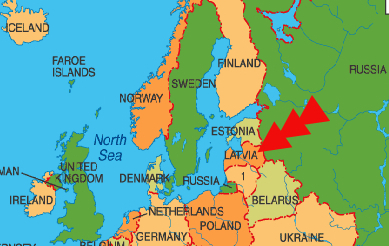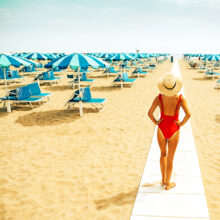Fascinating Spa Briefing From Latvia
- Published: Tuesday, May 3rd 2011
- in Living Well
 While many of us have some understanding about the spa and wellness arena in various countries around the world, my guess is that very few of us know much about what is happening in Latvia. In fact, finding Latvia on the map is probably a challenge for a lot of us which is why I thought providing the map on the left might be of help.
While many of us have some understanding about the spa and wellness arena in various countries around the world, my guess is that very few of us know much about what is happening in Latvia. In fact, finding Latvia on the map is probably a challenge for a lot of us which is why I thought providing the map on the left might be of help.
I am very glad that Alla Sokolova, General Manager of IWC Balans in Latvia, took the time to do a briefing paper for the upcoming Global Spa Summit. She gives us a very interesting glimpse into a market where many of the guests are Russian, and yet where online last minute hot deals are “in!” Hope you enjoy this briefing.
Susie
Briefing Paper: Europe – Latvia
SUBMITTED BY:
Alla Sokolova
General Manager
IWC Balans
Latvia
What are some changes you have noticed in your customers this past year? Are you seeing any new requests from consumers?
The political instability, terror attacks, and climate cataclysms in Moscow have created a higher inflow of Muscovites to Jurmala. The number of guests for one week stays grew by 40%. According to the Latvian tourism association, the number of Russian tourists grew by 79% compared to 2009.
Our customers are increasingly open to energy healing and alternative therapies such as Aura Soma, Kinesiology and Bach remedies, guests are interested to learn more and we see higher seminars attendance rates on these topics, and increase in consultation sales by 17%.
Taking a wellness break with the whole family is becoming the main reason why guests choose Amber SPA Boutique Hotel. Clients want to be able to benefit from a detox or weight loss program together, sharing the wellness journey. The most surprising requests are mothers wanting to bring babies to the treatment room, so while the baby is sleeping, mum is getting a massage.
The motivation for starting a wellness program is shifting from weight loss to detox and addressing various health symptoms such as hormonal imbalances, gastro-intestinal issues and chronic fatigue. Clients are more demanding and information savvy, asking questions and doing personal research on the benefits of diagnostics and treatments. Recently we noticed a trend of doctors and medical specialists making use of one week’s wellness programs to adjust personal health and learn more about alternative therapies.
For the local spa clientele, price is the most important decision making factor. The rationale is choosing the best quality within the lowest price range, and the motivation is often wanting quick result. Online discount coupons, local analogies to wahanda, such as atzklaides clubs, have become an increasingly popular way to buy services such as SPA treatments online, in form of “last minute hot deals.”
What sectors do you see attracting the most investment capital these days? What about when it comes to the spa and wellness arena?
Latvia is a country that has been most affected by the global economic crisis, in the European Union with a GDP decline of 26%. Investment is happening on a low scale, and economy is generally stagnant. A new regulation that came in effect summer of 2010, that one is able to receive a permanent residence when investing 70,000 Euros in Latvia; this has caused an increase in property and minor business investment, especially amongst Russian businessmen. Investment in logistics and port terminals is most attractive, as the Baltics is the only free economic zone within the EU.
There is low investment in spa and wellness sectors as the local market is very small, the seaside resorts are affected by seasonality and there is little information flow on wellness heritage and opportunities in Latvia. The only international brand in present in this segment is ESPA.
What is the future looking like for spa and wellness in your country?
An inbound of cheap airlines will create an increased interest of new markets entering Latvia, discovering the strong heritage, abundant nature and easy logistics, perfect for spa and wellness holidays. Latvia is increasingly becoming more popular amongst tourists from Scandinavia, U.K., Ireland, Germany, Italy, Spain and France. The pleasant experience is supported by generally high service standards, education, English language and good value for money.
New air routes are opening, connecting Latvia to the Middle East and Caucasus, creating stop over opportunities and high interest for longer stays amongst tourists from Armenia, Uzbekistan, and Georgia. For the ex-Soviet countries, Latvia’s most unique selling point is being able to provide European standards yet be widely Russian speaking. It is regaining its reputation of being a true bridge between the East and West, and for entrepreneurs from the Caucuses is an easy entry point to European market.
With increased investments amongst Russian entrepreneurs, easy access, Jurmala is regaining its reputation of being an ideal wellness resort for families and professional athletes. With Russia hosting the next Olympics and World Cup, Jurmala is a high interest area to be chosen as a training base, historically famed for being one of the best training bases throughout Soviet Union. Wellness is an integral part of the training process; therefore upgrades of existing bases and creation of new resorts are in feasibility phases.
There will be development of abandoned tradition wellness/rehabilitation “sanatoriums,” creating mixed used facilities and wellness resorts according to international standards. Spa and wellness educational programs are expanding with the Latvian Spa School getting ITEC accreditation, preparing well-educated spa labour.
My twitter address: @susieellis


